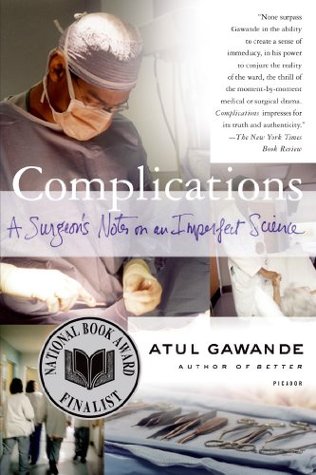More on this book
Community
Kindle Notes & Highlights
by
Atul Gawande
Read between
March 13, 2016 - May 4, 2018
Even worse than losing self-confidence, though, is reacting defensively. There are surgeons who will see faults everywhere except in themselves. They have no questions and no fears about their abilities. As a result, they learn nothing from their mistakes and know nothing of their limitations.
The British psychologist James Reason argues, in his book Human Error, that our propensity for certain types of error is the price we pay for the brain’s remarkable ability to think and act intuitively—to sift quickly through the sensory information that constantly bombards us without wasting time trying to work through every situation anew. Thus systems that rely on human perfection present what Reason calls “latent errors”—errors waiting to happen.
James Reason makes another important observation: disasters do not simply occur; they evolve. In complex systems, a single failure rarely leads to harm. Human beings are impressively good at adjusting when an error becomes apparent, and systems often have built-in defenses.
But errors do not always become apparent, and backup systems themselves often fail as a result of latent errors.
Neff recognizes at least four types of behavioral sentinel events. There is persistent, poor anger control or abusive behavior. There is bizarre or erratic behavior. (He saw a doctor who could not get through the day without spending a couple of hours arranging and rearranging his desk. The doctor was found to have severe obsessive-compulsive disorder.) There is transgression of proper professional boundaries. (Neff once saw a family physician who was known to take young male patients out alone for dinner and, in one instance, on vacation with him. He turned out to have compulsive fantasies of
...more
human beings commonly imagine patterns (whether good or bad) where really there are none. It’s just how our brains work.
Based on surveys, Donald Dossey, a North Carolina behavioral scientist, estimates that between seventeen million and twenty-one million Americans suffer mild to severe anxiety or change their activities because of paraskevidekatriaphobia (which is Greek for “fear of Friday the thirteenth”).
If an overactive neuronal system is the problem, then what one needs is a drug that will damp it down. That’s why, in what a decade ago might have seemed a strange development, pain specialists increasingly prescribe anti-epileptic drugs, like carbamazepine and gabapentin, for their most difficult-to-treat patients.
People break out in a cold sweat. Fatigue and often drowsiness occur in minutes. Attention, reflexes, and concentration wane. While all this is going on, the stomach develops abnormal electrical activity, which prevents it from emptying and causes it to relax. The esophagus contracts, pulling the upper portion of the stomach from the abdomen, through the diaphragm, and into the chest, forming a kind of funnel from stomach to esophagus. Then, in a single movement, known as the “retrograde giant contraction,” the upper small intestine evacuates its contents backward into the stomach in
...more
Seasickness has been a major military concern dating back to ancient Greece. (The word nausea comes from the Greek word for ship.)
Cybersickness continues to hobble the development of virtual reality devices. And space sickness is a frequent, though rarely mentioned, problem for astronauts.
The benefit of vomiting after eating something poisonous or tainted is obvious: the toxin is expelled. And the dreadfulness of the accompanying nausea deters you from ever wanting to eat anything like it again. This explains why pills, chemotherapy, and general anesthetics so often cause nausea and vomiting: they are poisons—albeit controlled ones—and the body is designed to reject them.
Pregnancy sickness, Profet suggested, may have evolved to reduce an embryo’s exposure to natural toxins. She pointed out that women with pregnancy sickness strongly prefer bland foods that do not spoil easily (like breads and cereals) and are particularly averse to foods associated with high levels of natural toxins, such as bitter or pungent foods and animal products that are not extremely fresh. The theory also explains why sickness occurs mainly during the first trimester. That is when the embryo develops organs and is most sensitive to toxins; at the same time, it is small and its calorie
...more
Researchers have now established that motion sickness occurs when there is a conflict between the motion we experience and the motion we expect to experience.
the brain has a vomiting program (or “module”) that receives and responds to all kinds of inputs: from chemoreceptors in the nose, the gut, and the brain; from receptors that detect overfilling of the stomach or tickling of the uvula; from motion sensors in the inner ear; and from higher brain centers governing memory, mood, and cognition.
people with the rare condition known as rumination syndrome have an unexplained tendency to vomit food up from their stomach into their mouth shortly after every meal—this without any associated nausea.
it is now evident that, once symptoms of severe nausea (or, for that matter, pain) develop and progress, they become increasingly resistant to therapies of any kind. The best approach, palliative specialists have learned, is to start treatment when the symptoms are mild—or, in some circumstances, even before they appear—and that proves true whether you’re a passenger about to board a ship or a cancer patient about to start chemotherapy.
According to guidelines used at Children’s Hospital in Boston, for example, any bruise, facial laceration, or long-bone fracture in an infant is supposed to be considered evidence of possible abuse.


